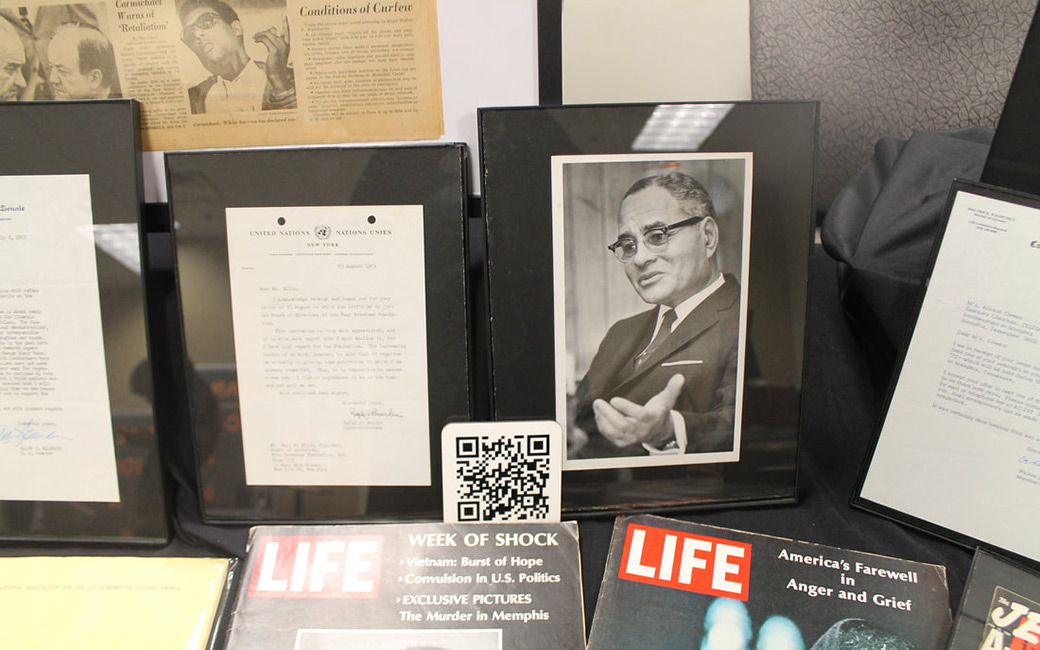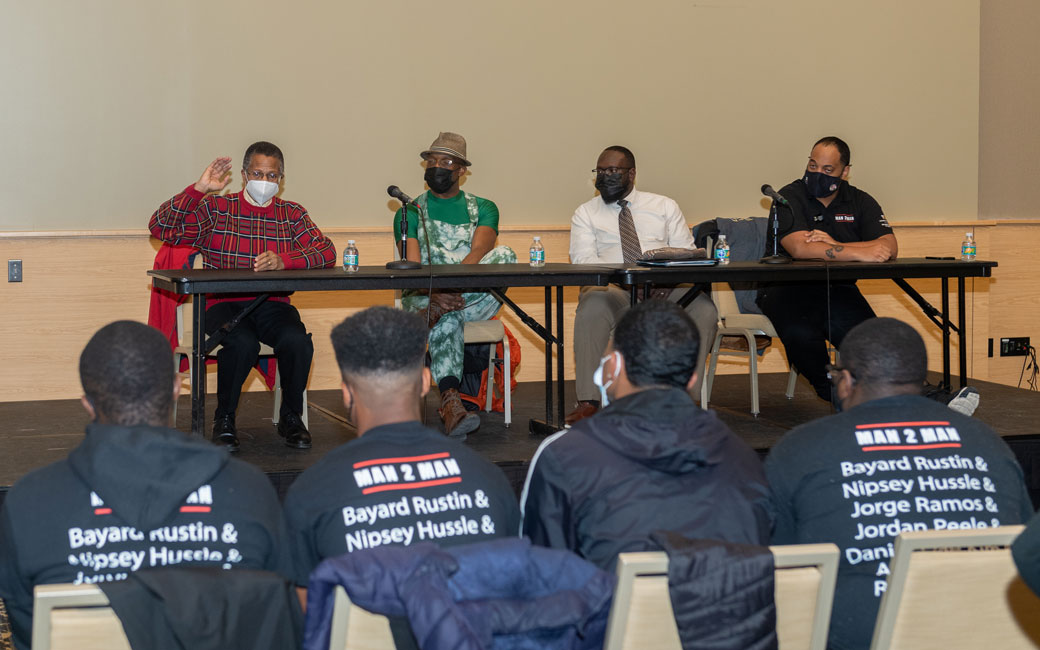Events and other ways you can still engage in Black History Month at TU
Celebrate Black History Month with scholarly lectures, pop-up exhibitions and recurring student programming on campus
By Towson University on February 16, 2022

As the TU community continues to observe and celebrate Black History Month, there
are still opportunities to engage in events and programming that celebrate Black history
and culture.
Towson University is also highlighting year-round programming for Black and other
affiliate student groups.
“It’s important to remember that Black History/African-American Heritage is so multifaceted
that we have to program all year round even to begin to explore the many identities
and experiences that have influenced the culture,” says Phillips Thomas Hornbuckle,
director of the Center for Student Diversity. “We are thrilled that February can be a time when people feel especially encouraged
to start or continue their education on this.”
The Department of History’s third annual Human Rights and History Lecture, Rights for Women of Color in Medieval Europe, brings to students the pressing question in medieval studies about the role and place of people of color in the European Middle Ages. Kimberly Katz, professor of history and coordinator of the human rights and history minor, notes that this topic allows students to “grapple with the notion of when rights came to diverse peoples across political societies.” Katz selected speaker Lynn Ramey, professor of French at Vanderbilt University, to bring awareness of the relationship between historical problems and contemporary issues.
This lecture is in fact timely, Katz adds, given the current “raging debates in medieval studies about people of color in the Middle Ages.” In recent years, scholars of color in this field have publicly challenged their colleagues to confront prevalent connotations related to white supremacy, Katz explains. Ramey’s lecture will in part, directly debunk the notion that the Middle Ages were purely white and European.
Here is a look at those, and other special events that take place during the second half of February:
Human Rights & History Lecture: Rights for Women of Color in Medieval Europe
Thurs., Feb. 17, 5 p.m., LA 4310 and Zoom
Join Lynn Ramey, professor of French at Vanderbilt University, for the 3rd annual Human Rights and History Lecture: Rights for Women of Color in Medieval Europe. Ramey is the author of “Black Legacies: Race and the European Middle Ages.” Sponsored by the history department and the minor in human rights and history, the event is one of two lectures each year bringing speakers to campus who offer their perspectives on human rights issues. The lectures are free and open to the public. Register to attend.
Post-Colonial African Body: A Philosophical Reflection
Tue., Feb. 22, 5 p.m., LA 4310 and Zoom
John Murungi, TU professor of philosophy, gives a lecture reflecting upon Colonialism and the African body. Murungi has authored multiple publications covering topics of African philosophy, Colonialism and aesthetics.
Homage: Traveling Black History Exhibit
Wed., Feb 23, 11 – 3 p.m., University Union Ballrooms
The Center for Student Diversity will be hosting Homage: Traveling Black History Exhibit. This is an archival exhibit which creates learning opportunities around original historical and cultural artifacts. The exhibit displays select pieces from the private collection of Nia and Morris McAdoo, including artwork by artists such as Romare Bearden and Elizabeth Catlett alongside original documents from Frederick Douglass, Shirley Chisholm, Booker T. Washington, Ralph Bunche and more.
Surviving Southampton: African American Women and Resistance in Nat Turner's Community
Thurs., Feb. 24, 4 p.m., Zoom
The Department of History presents a conversation with Vanessa Holden, an associate professor of history and African American and Africana studies at the University of Kentucky about her work surrounding Black women and their participation in Nat Turner’s Rebellion. Holden is the author of “Surviving Southampton: Gender and Community the Southampton Rebellion of 1831.” Register to attend.
Food, Culture and Memoir with Levita Mondie
Mon., Feb. 28, 6 p.m., Zoom
Levita Mondie, a vegan chef, teacher and writer, discusses how food is an area to see the connections between African Americans and their African roots—from the food itself to how it is prepared. She will also discuss reconnecting with African roots through food and expand upon the idea of “memoir”—how we remember and how we tell our own stories. Attend via Zoom.
Year-round programming

Along with these one-time events, there are a number of recurring programs offered across campus that exemplify TU's commitment to diversity and inclusion:
Man 2 Man (Weekly)
Mondays, 3:30 p.m. - 4:30 p.m., UU 322
Created by Student Success Programs, TU men of color gather each week in this confidential space for male-identified
students of color to develop a better understanding of themselves and others in the
context of gender, race, culture and social pressure. Request information to join or partner with Man 2 Man.
Generation One (Bi-Weekly)
Wednesdays, starting February 16, 1 p.m. – 2 p.m., UU 321B
Offered in collaboration with the Student Success Programs and the Counseling Center, Generation One is a program providing first-generation college students attending TU with tailored mentoring and guidance to foster both academic and personal accomplishment.
Generation One connects students who share similar experiences to share strategies to deal with difficult situations and provide encouragement during challenging and rewarding times.
Ujima
Ujima is a collective of student organizations whose sole purpose and mission is to educate and uplift students who identify as part of the African Diaspora.
The collective came from a place where Black student organizations felt as though they were collectively being discriminated against. Ujima offers a space for students to talk about collective issues and create strategies for addressing them.
Learn more about the 19 different Black student organizations that make up Ujima, and for more information go to involved.towson.edu.
The Black Student Leadership Conference
The Black Student Leadership Conference focuses on highlighting community members who have followed a personal passion and
realized a professional dream. Attendees will learn how to acknowledge challenges,
build resiliency and empower themselves as current and aspiring student leaders of
color to use their talents and abilities to serve their communities.
Follow the Center for Student Diversity’s Instagram and Facebook accounts for this year’s dates and how to register.
For more events or to have your event listed in a future story, use the master events calendar at events.towson.edu.